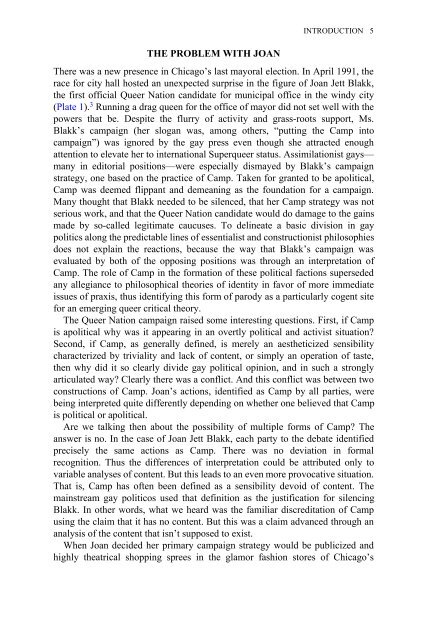Edited by Moe Meyer - Get a Free Blog
Edited by Moe Meyer - Get a Free Blog
Edited by Moe Meyer - Get a Free Blog
You also want an ePaper? Increase the reach of your titles
YUMPU automatically turns print PDFs into web optimized ePapers that Google loves.
THE PROBLEM WITH JOAN<br />
INTRODUCTION 5<br />
There was a new presence in Chicago’s last mayoral election. In April 1991, the<br />
race for city hall hosted an unexpected surprise in the figure of Joan Jett Blakk,<br />
the first official Queer Nation candidate for municipal office in the windy city<br />
(Plate 1). 3 Running a drag queen for the office of mayor did not set well with the<br />
powers that be. Despite the flurry of activity and grass-roots support, Ms.<br />
Blakk’s campaign (her slogan was, among others, “putting the Camp into<br />
campaign”) was ignored <strong>by</strong> the gay press even though she attracted enough<br />
attention to elevate her to international Superqueer status. Assimilationist gays—<br />
many in editorial positions—were especially dismayed <strong>by</strong> Blakk’s campaign<br />
strategy, one based on the practice of Camp. Taken for granted to be apolitical,<br />
Camp was deemed flippant and demeaning as the foundation for a campaign.<br />
Many thought that Blakk needed to be silenced, that her Camp strategy was not<br />
serious work, and that the Queer Nation candidate would do damage to the gains<br />
made <strong>by</strong> so-called legitimate caucuses. To delineate a basic division in gay<br />
politics along the predictable lines of essentialist and constructionist philosophies<br />
does not explain the reactions, because the way that Blakk’s campaign was<br />
evaluated <strong>by</strong> both of the opposing positions was through an interpretation of<br />
Camp. The role of Camp in the formation of these political factions superseded<br />
any allegiance to philosophical theories of identity in favor of more immediate<br />
issues of praxis, thus identifying this form of parody as a particularly cogent site<br />
for an emerging queer critical theory.<br />
The Queer Nation campaign raised some interesting questions. First, if Camp<br />
is apolitical why was it appearing in an overtly political and activist situation?<br />
Second, if Camp, as generally defined, is merely an aestheticized sensibility<br />
characterized <strong>by</strong> triviality and lack of content, or simply an operation of taste,<br />
then why did it so clearly divide gay political opinion, and in such a strongly<br />
articulated way? Clearly there was a conflict. And this conflict was between two<br />
constructions of Camp. Joan’s actions, identified as Camp <strong>by</strong> all parties, were<br />
being interpreted quite differently depending on whether one believed that Camp<br />
is political or apolitical.<br />
Are we talking then about the possibility of multiple forms of Camp? The<br />
answer is no. In the case of Joan Jett Blakk, each party to the debate identified<br />
precisely the same actions as Camp. There was no deviation in formal<br />
recognition. Thus the differences of interpretation could be attributed only to<br />
variable analyses of content. But this leads to an even more provocative situation.<br />
That is, Camp has often been defined as a sensibility devoid of content. The<br />
mainstream gay politicos used that definition as the justification for silencing<br />
Blakk. In other words, what we heard was the familiar discreditation of Camp<br />
using the claim that it has no content. But this was a claim advanced through an<br />
analysis of the content that isn’t supposed to exist.<br />
When Joan decided her primary campaign strategy would be publicized and<br />
highly theatrical shopping sprees in the glamor fashion stores of Chicago’s


